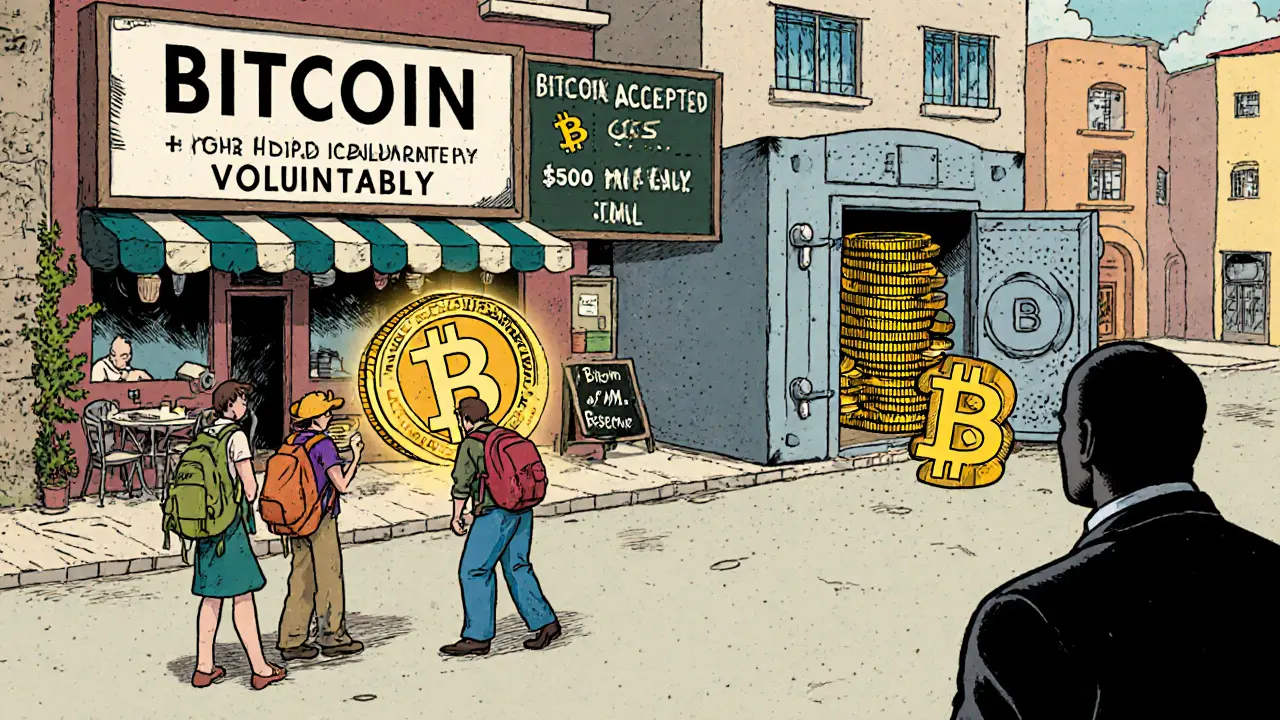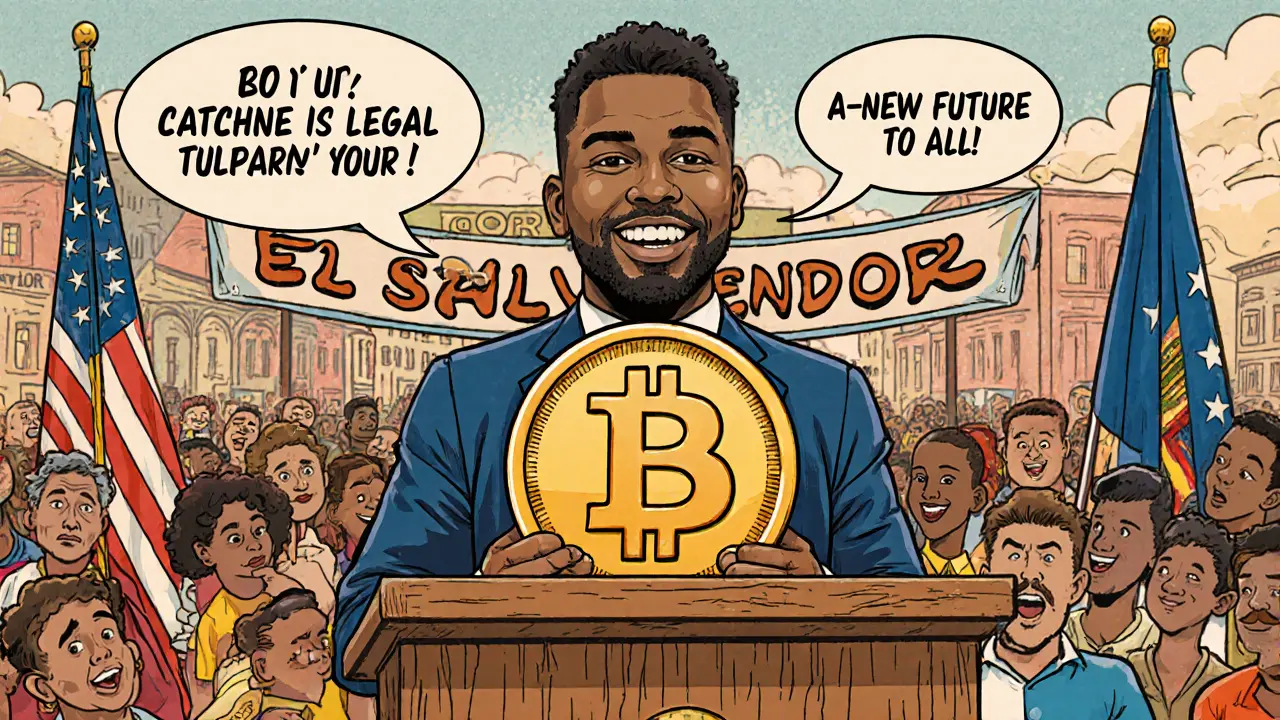Bitcoin Volatility Calculator
Calculate Bitcoin Value Changes
Key Takeaways
- El Salvador made Bitcoin legal tender in 2021, but the law was softened in 2025 after IMF pressure.
- The Chivo wallet saw massive download numbers, yet daily use stayed under 15%.
- Government reserves grew to over 6,000 BTC, showing confidence in crypto as a store of value.
- Businesses are no longer forced to accept Bitcoin; acceptance is now voluntary.
- Financial‑inclusion goals were largely unmet, but the country keeps a crypto‑friendly reputation.
Bitcoin is a decentralized digital currency that operates on a peer‑to‑peer network without a central bank. On El Salvador, President Nayib Bukele announced on 7 September 2021 that Bitcoin would become legal tender alongside the US dollar. The move was marketed as a shortcut to financial inclusion, cheaper remittances, and a boost for tech investment.
How the Bitcoin Law Was Implemented
When the law took effect, the government rolled out the official Chivo wallet. Every citizen received a $30 seed amount, and gas stations offered 20 cents per gallon discounts for payments made through the app. Within the first month, the wallet logged 3 million downloads - roughly 46 % of the nation’s 6.5 million people.
Despite the impressive download rate, actual spending was low. Surveys showed only 12 % of Salvadorans used Bitcoin for purchases in the first month, and 93 % of businesses reported receiving no Bitcoin payments at all. Technical glitches - from server overload on launch day to hacking attempts later - further eroded trust.
Why the Experiment Faced Trouble
Three factors kept the adoption flat:
- Volatility: Bitcoin’s price swung wildly in 2021, even dropping below $30,000 on launch day. A $3 million paper loss forced the government to buy more coins to keep the price above $52,000.
- Infrastructure gaps: Rural areas lack stable internet, and many merchants struggled to integrate QR‑code payment terminals.
- Regulatory pressure: The International Monetary Fund (IMF) warned that the policy conflicted with sound monetary practices and tied a $1.4 billion loan to policy changes.
By 2024, 92 % of the population still did not use Bitcoin for everyday transactions, and only 5 % paid taxes with it.
IMF‑Driven Policy Reversal in 2025
In January 2025, after intense negotiations, the Legislative Assembly voted 55‑2 to amend the Bitcoin law. The amendment removed the word “currency” from Bitcoin’s status and eliminated the mandate for businesses to accept it. Effective 1 May 2025, Bitcoin remains legal tender in name only - use is voluntary, and tax payments must be in US dollars.
Economist Rafael Lemus summed it up: “Bitcoin no longer has the strength of legal tender. The government forced it, and it didn’t work.” President Bukele later called Bitcoin the “most unpopular” measure of his administration.
What Changed After the Amendment?
| Aspect | 2021‑2024 (Mandatory) | 2025‑Present (Voluntary) |
|---|---|---|
| Legal status | Declared legal tender; businesses required to accept | Legal tender in name only; acceptance optional |
| Tax payments | Allowed in Bitcoin | Must be in US dollars |
| Government incentives | $30 seed money per citizen, fuel discounts | No new incentives; previous seed funds remain |
| Business compliance | Mandated by law, fines for non‑acceptance | No penalties; voluntary adoption |
| Public usage rate | ~12 % of adults used Bitcoin for purchases | Estimated <5 % daily usage |
The table shows that while the legal language stayed, the practical obligations disappeared. This shift gave merchants breathing room and aligned El Salvador with IMF conditions.

Current Crypto Landscape in El Salvador
Even after the rollback, the government keeps a sizable crypto reserve. As of early 2025, the Strategic Bitcoin Reserve Fund held about 6,102 BTC, worth roughly $500 million. The reserve generated a $287 million profit, showing that the state still views Bitcoin as a long‑term store of value.
El Salvador also hosts events like the PLANB Forum 2025, positioning the country as a regional hub for blockchain developers and crypto investors. Private‑sector startups are building Lightning‑network services, and some hotels now accept Bitcoin without any government mandate.
Lessons Learned for Future National Crypto Projects
If another country wants to follow El Salvador’s footsteps, a few takeaways stand out:
- Organic demand beats mandates: Forcing merchants to accept a volatile asset creates friction. Voluntary adoption, supported by education, yields better results.
- Stable‑coin or CBDC alternatives: A sovereign digital currency linked to a stable asset avoids price swings that scare everyday users.
- Infrastructure first: Reliable internet, point‑of‑sale hardware, and consumer‑friendly wallets are prerequisites.
- Clear regulatory framework: International bodies like the IMF will scrutinize any policy that changes monetary fundamentals.
El Salvador’s experiment provides the world’s first real‑world data on a nation‑wide crypto rollout. The numbers show that technology alone cannot overcome deep‑seated trust issues and macro‑economic realities.
Practical Guide for Residents and Visitors
If you’re living in or traveling to El Salvador in late 2025, here’s what you need to know:
- Using the Chivo wallet: The app is still available on iOS and Android. You can top it up with US dollars, but there’s no longer a government‑mandated discount for fuel.
- Paying for goods: Ask merchants if they accept Bitcoin. Expect around 10‑15 % of shops in major cities to do so voluntarily.
- Taxes and bills: All tax filings must be in US dollars. Bitcoin cannot be used for government payments.
- Remittances: Companies like Bitso and Ripple still offer cheaper cross‑border transfers, and many Salvadorans use Bitcoin to move money home.
- Safety tips: Keep a backup of your wallet seed phrase, enable two‑factor authentication, and be wary of phishing scams that increased after the 2022 hacks.
Following these steps will let you benefit from the remaining crypto‑friendly aspects while avoiding the pitfalls that plagued the early rollout.
Future Outlook
El Salvador’s stance is likely to stay “crypto‑friendly but not compulsory.” The government continues to buy Bitcoin, betting on long‑term appreciation, yet it has stepped back from trying to force daily transactions. Analysts predict that as Lightning‑network services mature, voluntary usage could creep up to 20 % within the next three years, especially if other Latin‑American nations adopt similar policies.
For now, the country serves as a living laboratory: a place where the world can watch how a developing economy wrestles with cutting‑edge finance, learns from missteps, and gradually finds a sustainable balance.

Is Bitcoin still legal tender in El Salvador?
Yes, Bitcoin remains legal tender in name, but businesses are not required to accept it and taxes must be paid in US dollars.
Do I need the Chivo wallet to use Bitcoin in El Salvador?
No. The Chivo wallet is the government‑backed app, but any compatible Bitcoin wallet works for voluntary transactions.
How much Bitcoin does the government hold?
The Strategic Bitcoin Reserve Fund holds about 6,102 BTC, valued at roughly $500 million as of early 2025.
Can I pay taxes with Bitcoin?
No. Since the 2025 amendment, all tax payments must be made in US dollars.
What are the main reasons the policy was changed?
International Monetary Fund pressure, low commercial adoption, and the volatility of Bitcoin prompted the government to soften the law.


Molly van der Schee
October 20, 2025 AT 08:24It’s striking how a policy meant to boost inclusion ended up highlighting the digital divide in El Salvador. The enthusiasm around the Chivo wallet was palpable, but without reliable internet, many felt left behind. I can see the frustration of merchants who were forced into a system they weren’t ready for. Still, the fact that the government kept a sizable BTC reserve suggests they still believe in the technology’s future.
Mike Cristobal
October 23, 2025 AT 19:44Forcing a volatile asset on a population is morally indefensible – it exploits people’s savings for political spectacle. The IMF warned us for a reason, and the government chose to ignore it. 😒
Mike GLENN
October 27, 2025 AT 06:04The transition from mandatory to voluntary Bitcoin usage in El Salvador represents a fascinating case study in policy elasticity. When the government initially forced merchants to accept the digital currency, many small vendors balked at the technical demands. Over time, the fear of price volatility eroded confidence among both consumers and businesses. The $30 seed allocation, while generous on paper, proved insufficient to offset transaction fees and learning curves. Moreover, the rural infrastructure gaps meant that many citizens could not reliably access the Chivo wallet. As the IMF applied pressure, the legislature began to reconsider the legal language surrounding Bitcoin. The amendment in 2025 stripped the word “currency” and removed enforcement penalties. This subtle linguistic shift signaled to the market that Bitcoin was now an optional asset rather than a compulsory medium. Data shows that after the amendment, daily transaction volume dipped marginally, suggesting that only true enthusiasts remained active. Nevertheless, the government's reserve of over 6,000 BTC has grown, indicating a strategic hedge against future financial instability. Critics argue that this reserve could be a political bargaining chip rather than a genuine store of value. Supporters counter that the holdings provide a buffer against external shocks, especially in a dollarized economy. From a macroeconomic perspective, the experiment has illuminated the challenges of integrating decentralized assets into sovereign monetary frameworks. Future policymakers worldwide will likely study El Salvador’s experience when crafting their own digital asset regulations. Ultimately, the voluntary phase may serve as a laboratory for sustainable crypto adoption, provided that education and infrastructure keep pace.
BRIAN NDUNG'U
October 30, 2025 AT 17:24Esteemed colleagues, the shift toward a voluntary framework may indeed catalyze a more organic adoption curve. By removing punitive mandates, the government respects market dynamics, thereby fostering confidence among stakeholders. Nonetheless, one must acknowledge the residual skepticism that lingers post‑amendment. It remains incumbent upon policymakers to invest in digital literacy and infrastructural robustness.
Donnie Bolena
November 3, 2025 AT 04:44What a roller‑coaster! The initial hype, the massive download numbers, the inevitable fallout-yes, it’s all been a wild ride!!! But hey, optimism remains: maybe the voluntary era will finally let the true believers shine, free from bureaucratic shackles!!!
Joy Garcia
November 6, 2025 AT 16:04Listen, the whole Bitcoin experiment is just a gigantic distraction orchestrated by shadowy elites to siphon our wealth! They flooded us with shiny promises while the real agenda was surveillance and control-do you really think a tiny island could battle the global financial cabal on its own?
mike ballard
November 10, 2025 AT 03:24From a fintech integration perspective, the Chivo rollout suffered from suboptimal API latency and insufficient SDK documentation-practically a sandbox environment for developers 😅. Scaling adoption requires robust middleware, otherwise you’re just marching in circles.
Erik Shear
November 13, 2025 AT 14:44Voluntary Binance adoption works.
Benjamin Debrick
November 17, 2025 AT 02:04Indeed, the legislative recalibration, albeit ostensibly progressive, merely rebranded an erstwhile coercive mandate; the semantic excision of the term ‘currency’ does not, in any substantive ontological sense, diminish the underlying fiduciary imperatives that continue to compel the populace toward digital asset engagement-an elegant, if somewhat disingenuous, semiotic maneuver, would you concur?
Anna Kammerer
November 20, 2025 AT 13:24Oh sure, because giving a $30 seed and then pulling the rug is exactly how you build trust… Nice job, really.
Elizabeth Chatwood
November 24, 2025 AT 00:44i think its pretty cool that they givin out btc but many people dont use it lol its kinda sad bc its a chance to learn about finance
Tom Grimes
November 27, 2025 AT 12:04Okay, look, I’m not trying to be rude but the whole thing feels like a bad reality‑show where the prize is a volatile coin and the contestants are everyday families. They’re told to download an app, get a tiny bonus, and then watch the price swing like a pendulum. Meanwhile, the government sits back, collects data, and pretends to care about inclusion. It’s a classic case of techno‑optimism colliding with harsh economic realities, and the result is a mess that leaves most people confused and a little angry.
Paul Barnes
November 30, 2025 AT 23:24Actually, forcing a payment method never works-people push back, and the market self‑corrects.
Rebecca Kurz
December 4, 2025 AT 10:44Of course, the whole thing is orchestrated by hidden cabals-don’t you see the pattern? The IMF, the banks, the elites… all feeding the same narrative!!!
Patrick Day
December 7, 2025 AT 22:04Yo, the deep‑state is definitely behind this, no doubt. They want us all hooked on crypto so they can control us better.
Tom Glynn
December 11, 2025 AT 09:24Let’s remember that every policy is a learning opportunity. 🌱 Even if the rollout faced issues, the data gathered can guide better implementations in the future. Keep an open mind and stay curious! 😊
Johanna Hegewald
December 14, 2025 AT 20:44For anyone still unsure: the Chivo wallet’s technical requirements include a stable internet connection and a smartphone capable of QR scanning. If those conditions aren’t met, the user experience will be frustrating.
Jireh Edemeka
December 18, 2025 AT 08:04Well, isn’t it just adorable how they try to spin a half‑baked experiment as a success? The numbers speak for themselves.
del allen
December 21, 2025 AT 19:24Haha, yup, they try hard! 😂 But the reality is kinda sketchy, ya know?
Jon Miller
December 25, 2025 AT 06:44Wow, talk about drama! The whole Bitcoin saga in El Salvador reads like a thriller-plot twists, villains, and a reluctant hero.
Ty Hoffer Houston
December 28, 2025 AT 18:04Totally, it’s like watching a live experiment. Props to the folks who keep an open mind.
Ryan Steck
January 1, 2026 AT 05:24Wake up! They’re using crypto to track every move-don’t be a pawn in their game.
James Williams, III
January 4, 2026 AT 16:44In sum, El Salvador’s Bitcoin journey offers valuable lessons: policy flexibility, infrastructure readiness, and the importance of aligning incentives with real‑world usage. Future adopters would do well to heed these insights.